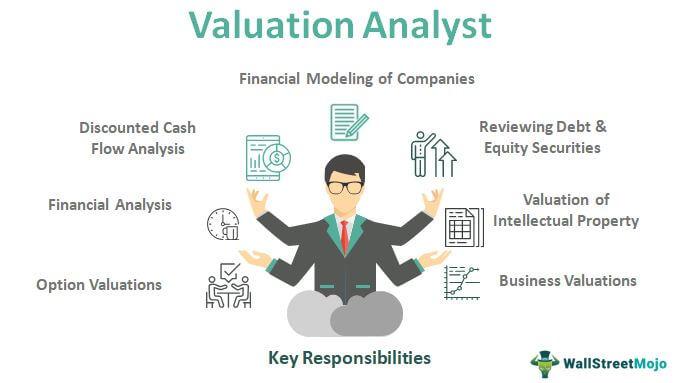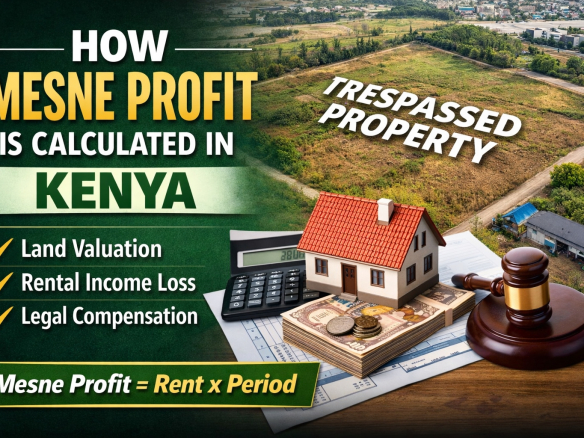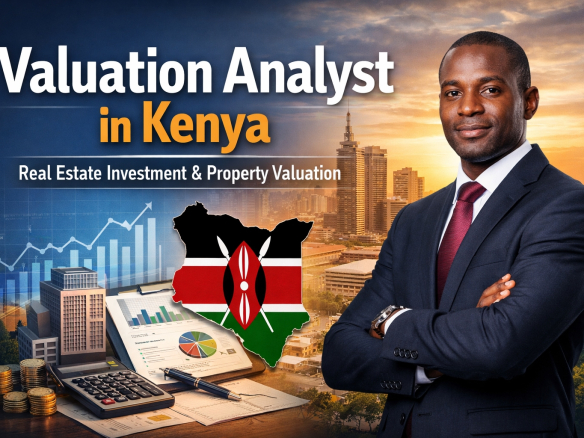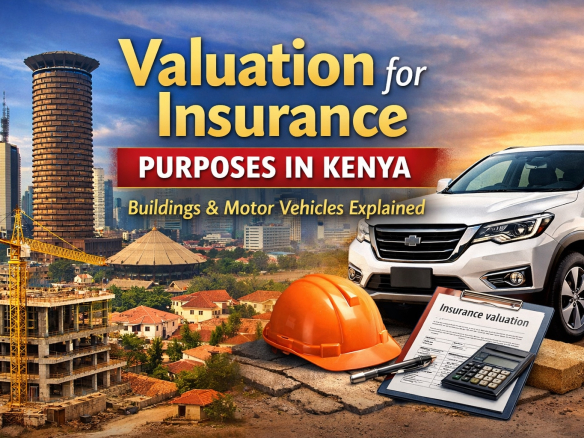Valuation Analyst vs. Property Valuer in Kenya: Understanding the Difference Across All Asset Classes
When it comes to determining the value of assets in Kenya—whether property, machinery, vehicles, or entire businesses—two professionals often come into play: the Valuation Analyst and the Property Valuer.
Although their roles may sound similar, they serve different purposes, apply different methodologies, and provide value to different types of clients. In Kenya, where real estate, manufacturing, agribusiness, and corporate investments continue to expand, understanding the distinction is crucial for investors, lenders, developers, and business owners.
This article provides a detailed comparison between valuation analysts and property valuers in Kenya, covering their scope of work, asset classes, methods, qualifications, and relevance in today’s market.
1. Who is a Property Valuer in Kenya?
A Property Valuer is a licensed professional who specializes in determining the market value of tangible assets. In Kenya, valuers must be registered with the Valuers Registration Board (VRB) and are often members of the Institution of Surveyors of Kenya (ISK).
Assets a Property Valuer Handles
-
Real estate – residential, commercial, industrial, and agricultural land
-
Buildings – apartments, offices, warehouses, hotels, factories
-
Movable assets – motor vehicles, furniture, office equipment
-
Plant and machinery – industrial equipment, manufacturing plants
-
Specialized properties – schools, hospitals, religious institutions
Common Uses of Property Valuation in Kenya
-
Mortgage financing (banks require valuation for loans)
-
Property sales and purchases
-
Compensation for compulsory land acquisition (e.g. government projects)
-
Rental assessments and lease negotiations
-
Insurance valuation
-
Statutory valuation (rates, taxation, probate/estate matters)
In summary, a Property Valuer in Kenya determines the fair market value of land, buildings, or physical assets.

2. Who is a Valuation Analyst in Kenya?
A Valuation Analyst focuses on economic and financial valuation. While property valuers deal with tangible assets, valuation analysts often cover businesses, securities, and intangibles.
They are usually finance professionals with backgrounds in accounting, economics, or corporate finance. Their reports are widely used by investors, private equity firms, regulators, and auditors.
Assets a Valuation Analyst Handles
-
Businesses and companies – valuing firms for mergers, acquisitions, or shareholder buyouts
-
Securities – shares, bonds, derivatives
-
Intangibles – goodwill, patents, trademarks, intellectual property
-
Portfolio valuations – private equity, investment funds
-
Complex asset combinations – for example, valuing an entire conglomerate with real estate, machinery, and operating companies
Common Uses of Valuation Analysts in Kenya
-
Mergers & acquisitions (M&A) transactions
-
Business restructuring or liquidation
-
Financial reporting and compliance (IFRS, audit support)
-
Investment decision-making
-
Shareholder disputes and litigation support
-
IPOs and capital raising exercises
In short, a Valuation Analyst in Kenya establishes the economic and financial value of a business or asset portfolio.

3. Valuation Methods: Analyst vs. Valuer
| Approach | Property Valuer | Valuation Analyst |
|---|---|---|
| Market Approach | Uses recent comparable sales of land, buildings, or vehicles in Kenya | Uses comparable company multiples (P/E, EV/EBITDA, etc.) |
| Income Approach | Capitalizes rental income or agricultural yields | Discounted Cash Flow (DCF), earnings capitalization |
| Cost Approach | Replacement cost of buildings, machinery, or vehicles, less depreciation | Asset-based valuation (Net Asset Value) |
| Specialized Methods | Statutory rating, insurance schedules | Precedent transactions, option pricing models |
4. Qualifications and Regulation in Kenya
-
Property Valuer
-
Must be registered with the Valuers Registration Board (VRB)
-
Typically holds a degree in Land Economics, Real Estate, or Surveying
-
Often a member of the Institution of Surveyors of Kenya (ISK)
-
-
Valuation Analyst
-
Background in finance, accounting, economics, or actuarial science
-
May hold professional certifications such as CPA, CFA, ACCA, CBV
-
Not licensed by VRB, but often guided by international standards (IVSC, IFRS)
-
5. When to Engage a Property Valuer vs. Valuation Analyst in Kenya
Hire a Property Valuer when you need:
-
A valuation for bank mortgage purposes
-
To buy or sell land or buildings in Nairobi, Mombasa, Kisumu, or other towns
-
Valuation of machinery, vehicles, or plant for insurance or financial reporting
-
Rental valuation for office, retail, or residential leases
-
Valuation for succession, probate, or taxation
Hire a Valuation Analyst when you need:
-
Valuation of an entire business or company in Kenya
-
Determining goodwill or intangible asset value during mergers & acquisitions
-
Financial reporting and compliance with international accounting standards
-
Business restructuring, IPO valuation, or private equity investments
-
Litigation support in shareholder or partnership disputes
6. When You Need Both: A Combined Approach
In certain asset categories, engaging both a Property Valuer and a Valuation Analyst is not only useful but necessary. For example:
-
Hotels and Resorts: A property valuer determines the land and building value, while a valuation analyst assesses the operating business, goodwill, and revenue potential.
-
Manufacturing Plants: The valuer handles land, factory buildings, and machinery, while the analyst values the business as a going concern, including future earnings.
-
Agribusinesses: The valuer establishes the worth of land and equipment, while the analyst values brand equity, customer contracts, and projected income streams.
-
Healthcare Facilities: A valuer focuses on the hospital buildings and equipment, while the analyst values the business operations, licensing rights, and intangible assets.
This combined approach gives a holistic view of both tangible and intangible value, allowing investors, lenders, and acquirers to make fully informed decisions.
7. The Kenyan Market Context
Kenya’s valuation sector is rapidly evolving. The demand for property valuers remains strong due to the growth in real estate, banking, infrastructure projects, and compulsory land acquisition. At the same time, valuation analysts are increasingly relevant with the rise of M&A activity, private equity investments, and cross-border corporate transactions.
Together, these two professionals play a central role in asset management, investment decisions, and economic growth in Kenya.
Both Property Valuers and Valuation Analysts are vital in Kenya’s economy. While property valuers specialize in tangible assets like land, buildings, and machinery, valuation analysts focus on businesses, securities, and intangible assets.
In many cases, especially where both physical and financial components are involved, you need the expertise of both to capture the true value of an asset. Whether you are buying property, investing in a company, or acquiring a complex business operation, understanding their roles ensures accurate and reliable valuation results.
Frequently Asked Questions (FAQs) on Valuation Analysts and Property Valuers in Kenya
1. Who regulates property valuers in Kenya?
Property valuers in Kenya are regulated by the Valuers Registration Board (VRB) under the Valuers Act (Cap 532). Many are also members of the Institution of Surveyors of Kenya (ISK).
2. Who regulates valuation analysts in Kenya?
Valuation analysts are not licensed by the VRB. Instead, they follow international financial reporting standards (IFRS) and global valuation guidelines such as those set by the International Valuation Standards Council (IVSC).
3. What qualifications are required to be a property valuer in Kenya?
A property valuer must hold a degree in Land Economics, Real Estate complete practical training, and be registered with the VRB.
4. What qualifications are required to be a valuation analyst in Kenya?
Valuation analysts usually hold degrees in finance, accounting, economics, or actuarial science and may hold certifications like CFA, CPA, ACCA, or CBV.
5. What is the difference between a property valuation and a business valuation?
A property valuation determines the market value of tangible assets like land, buildings, and machinery. A business valuation assesses the financial worth of a company, including goodwill, cash flow, and intangible assets.
6. How much does property valuation cost in Kenya?
Property valuation fees in Kenya are guided by the Valuers Act and ISK guidelines. Charges are typically a percentage of the property’s market value, with minimum fees applying.
7. How much does business valuation cost in Kenya?
Business valuation fees vary depending on the complexity of the business, the industry, and the scope of work. Most firms charge professional fees based on time spent, complexity, and reporting requirements.
8. Do banks in Kenya accept valuations from any valuer?
No. Most banks in Kenya have a panel of approved valuers. Only valuation reports from these listed firms are accepted for mortgage and loan purposes.
9. What is the role of a valuation analyst in mergers and acquisitions?
In M&A, a valuation analyst determines the economic value of a company, helping investors decide on fair purchase prices, assess goodwill, and evaluate future cash flows.
10. When do I need both a property valuer and a valuation analyst?
You need both when valuing assets that include physical property and business operations. For example, hotels, manufacturing plants, hospitals, and agribusinesses require both to capture land/buildings and operating business value.
11. Can a property valuer also do business valuation?
Yes, they can.
12. What is the Valuers Registration Board (VRB) in Kenya?
The VRB is a statutory body established under the Valuers Act to regulate and license property valuers in Kenya.
13. What is the Institution of Surveyors of Kenya (ISK)?
ISK is a professional body for surveyors and valuers in Kenya. It promotes professional standards, ethics, and continuous learning among members.
14. What methods do property valuers use in Kenya?
They mainly use the Market Approach, Income Approach, and Cost Approach depending on the asset type.
15. What methods do valuation analysts use in Kenya?
They apply Discounted Cash Flow (DCF), Comparable Company Analysis, Precedent Transactions, and Asset-Based Valuation methods.
16. Can property valuers handle movable assets like vehicles?
Yes. Property valuers in Kenya also value motor vehicles, furniture, office equipment, and machinery for insurance, loan, and disposal purposes.
17. Is a valuation report in Kenya legally binding?
A valuation report is an expert opinion, not a legal ruling. However, it is widely accepted in courts, banks, government agencies, and investment decisions.
18. How long does a property valuation take in Kenya?
Depending on size and complexity, a property valuation can take 1–5 days for residential and commercial properties, and longer for large estates or specialized assets.
19. How long does a business valuation take in Kenya?
Business valuations typically take 2–6 days, depending on the company’s size, financial complexity, and availability of records.
20. Why is valuation important in Kenya?
Valuation supports investment decisions, mortgage financing, property transactions, compensation, taxation, insurance, mergers, acquisitions, and dispute resolution. Accurate valuation ensures fair pricing and informed decision-making.
21. Can property valuers in Kenya value agricultural land?
Yes. Property valuers regularly handle farms, ranches, plantations, and other agricultural properties, considering soil quality, land use, and yields.
22. Do property valuers provide rental valuations?
Yes. Valuers determine market rent levels for residential, office, retail, and industrial leases in Kenya.
23. What is a going concern valuation?
A going concern valuation assesses both the operating business and its underlying assets, often requiring collaboration between property valuers and valuation analysts.
24. Can valuation be used for court cases in Kenya?
Yes. Valuation reports are commonly used in litigation, succession disputes, divorce settlements, and compensation cases.
25. What is the role of valuation in compulsory land acquisition?
During government projects (roads, railways, dams), property valuers determine the fair compensation payable to landowners.
26. Are valuation reports confidential in Kenya?
Yes. Valuers are bound by professional ethics and cannot disclose client information without consent, except where required by law.
27. Do valuation analysts in Kenya handle intellectual property (IP)?
Yes. They can value patents, trademarks, copyrights, software, and other intangibles, especially in sectors like tech, media, and healthcare.
28. How often should property be valued in Kenya?
For most purposes, property should be re-valued every 3–5 years, or sooner if there are significant market changes or new financing requirements.
29. What is the difference between fair value and market value?
-
Market Value: The price an asset would fetch in an open market.
-
Fair Value: The price agreed upon by knowledgeable parties, often used in accounting and financial reporting.
30. Which are the top valuation firms in Kenya?
Among the top valuation firms in Kenya are Avenue Valuers Limited (considered the leading firm in real estate, valuation, consultancy, and property management and real estate services. Both are trusted by banks, corporates, and private investors across the country.




Join The Discussion